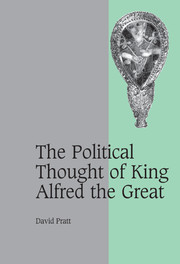Book contents
- Frontmatter
- Contents
- Acknowledgements
- List of abbreviations
- Note on citations
- Chapter 1 INTRODUCTION
- Part I The West Saxon Political Order
- Chapter 2 RESOURCES AND EXTRACTION
- Chapter 3 ROYAL LORDSHIP AND SECULAR OFFICE-HOLDING
- Chapter 4 ROYAL LORDSHIP AND ECCLESIASTICAL OFFICE-HOLDING
- Chapter 5 THE ARTICULATION OF POWER UNDER KING ALFRED'S PREDECESSORS
- Chapter 6 THE IMPACT OF THE VIKINGS
- Part II Alfredian Discourse and its Efficacy
- Appendix: West Frankish deployment of Solomon's dream
- Bibliography
- Index of manuscripts
- General index
- Cambridge Studies in Medieval Life and Thought Fourth Series
Chapter 2 - RESOURCES AND EXTRACTION
Published online by Cambridge University Press: 06 July 2009
- Frontmatter
- Contents
- Acknowledgements
- List of abbreviations
- Note on citations
- Chapter 1 INTRODUCTION
- Part I The West Saxon Political Order
- Chapter 2 RESOURCES AND EXTRACTION
- Chapter 3 ROYAL LORDSHIP AND SECULAR OFFICE-HOLDING
- Chapter 4 ROYAL LORDSHIP AND ECCLESIASTICAL OFFICE-HOLDING
- Chapter 5 THE ARTICULATION OF POWER UNDER KING ALFRED'S PREDECESSORS
- Chapter 6 THE IMPACT OF THE VIKINGS
- Part II Alfredian Discourse and its Efficacy
- Appendix: West Frankish deployment of Solomon's dream
- Bibliography
- Index of manuscripts
- General index
- Cambridge Studies in Medieval Life and Thought Fourth Series
Summary
The rise of Wessex in the first half of the ninth century was accompanied by grassroots economic change. Political expansion had been the achievement of Alfred's grandfather, Ecgberht (802–39), and father, Æthelwulf (839–58), tightening the hold of dynastic kingship; this order had itself contributed to a more intensive exploitation of expanding resources, commercial as well as agrarian. Both areas were sources of royal income: in the previous century, land and warfare had been increasingly supplemented by new forms of regularized payment, through the taxation of markets and exchange. In fiscal and monetary regulation, these structures presuppose aspects of central control; Balzaretti's reluctance to attribute any form of economic management to early medieval rulers seems inordinately destructive. For Wessex, his case can be countered by many of the effects of expansion, tapping the wealth of south-eastern trade; these extended to systems of military assessment, exercised more broadly in urban defence.
WEST SAXON RESOURCES AND ROYAL POWER
Though sometimes overstated, a strong case remains for royal promotion of markets from the earliest phases of Anglo-Saxon urban development. Merchants received legal protection: the control of trade enabled substantial extraction, both in bullion and in kind, through payment of tolls and issuing of coinage. The latter involved a potentially lucrative partnership between kings and moneyers, who were mercantile third parties rather than royal officials.
- Type
- Chapter
- Information
- The Political Thought of King Alfred the Great , pp. 17 - 27Publisher: Cambridge University PressPrint publication year: 2007

